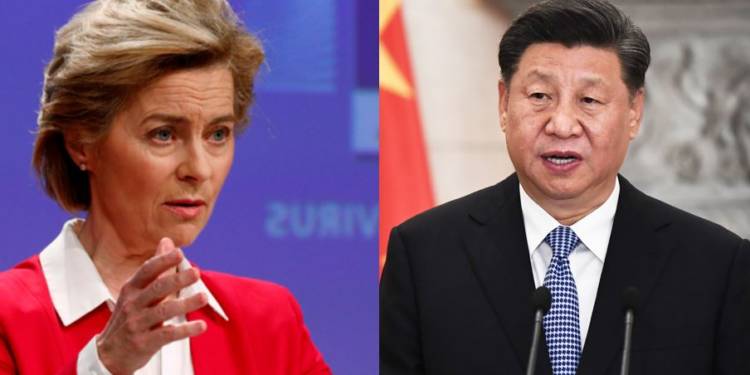China has made an enemy out of the entire democratic world from the ASEAN to the Oceania, and India to the US. But, what about the European Union? Is the EU a Chinese friend or an ally or at least a convenient partner? While Beijing would wish so, the EU has decided to dump China. In purely business terms, the EU’s attitude is one of casually dilly-dallying its China relationship.
Take the September 14 virtual Summit between the Chinese President Xi Jinping and the European leaders for instance. The EU is raising China’s hopes, but it has no real plans of finding any common grounds with China. The EU plans on procrastinating crucial issues like a Free Trade Agreement with China while making difficult demands of China like adopting free-market conditions and greater access to European businesses in the Chinese market.
At the same time, European business bodies plan on finding a way out of China, while the biggest of EU powers- France and Germany are planning an India pivot in the Indo-Pacific, which militates against Beijing’s Great Power ambitions. Yet other European governments are growing too critical of Chinese human rights violations and belligerence.
The EU is putting more pressure on China to act on Brussels’ terms, if the Dragon wants to continue a meaningful relationship with the intergovernmental organisation, ahead of the all-important September 14 Summit. The EU has already started giving hints of deteriorating business ties with China. The annual report of the European Chamber of Commerce in China has, for example, has warned that European companies in the Communist country are increasingly afraid of “arbitrary punishment” amidst rising Europe-China tensions.
The annual report further claims that European companies now “have even more reason to believe that they could become victims of arbitrary punishment” given the actions that their home governments are taking on issues like Chinese human rights violations in Xinjiang and Hong Kong.
Europe is thus quite clearly trying to diminish bilateral business ties with China by driving pessimism around the Communist-Authoritarian country. It is building up pressure against China, by weaponizing anything that it finds against China.
Given Beijing’s manipulative economic policies, there is a lot of incriminating matter that Europe can find against the Dragon. The European Chamber of Commerce is also demanding China to pause subsidies to state-owned companies and ensure fair competition. The business body also wants China to liberalise its FDI regime as many sectors of the Chinese economy impose restrictions on foreign companies.
The European Union Ambassador to China, Nicolas Chapuis said, “We have to fill the gap [between reality and promises].” He added, “Why does Huawei have a 40 per cent market share in Europe … and why do Eriksson and Nokia, the two European 5G companies, have a total of only 11 per cent [market] share in China? What is the problem?”
These demands of fairer treatment to European businesses in China are becoming more of an ultimatum to China. President of the European Chamber of Commerce has himself warned the Communist Government of China that the September 14 Summit is the last chance to strike an investment and trade deal.
The EU might not have explicitly shut its doors on China, but it has really outwitted China. While an isolated Beijing desperately looks for a trade deal, the EU is making demands that tend to destroy the very edifice of China’s State-led Capitalist economic model.
Moreover, China cannot make such unprecedented concessions to Europe because the United States is also watching closely and if the EU secures a favourable deal from Beijing, then the Trump administration would also start pushing for similar concessions from China.
Brussels will not ink a Free Trade Agreement with China if China doesn’t sign an investment treaty on terms being dictated by the European Union and European businesses. Also, the signals coming from Brussels are such that if China and the EU have to expand business relations, then it has to be now when the German Chancellor Angela Merkel is still the de facto EU leader.
Once Merkel is out of power, no leader in the European Union would be able to bring the organisation together on the subject of the EU’s China policy. Germany’s EU rotating chairmanship is going to end in January next year and Merkel is herself going to demit the office of German Chancellor next year. As such, no one is going to care for China once Merkel goes out of power. However, there is still no possibility of a China-EU investment deal in sight. China might have as well lost the last opportunity to formalise its business relations with Brussels.
The EU seems to be successfully delaying discussing critical matters with Beijing. And very soon, Beijing will come to realise that it has been tactfully undone and dumped by Brussels.
